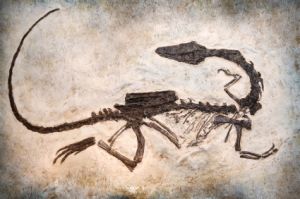
Can the truth behind the origin of life on Earth be established by a courtroom bet? This is precisely what one creationist hopes to accomplish by challenging anyone to disprove the literal interpretation of the book of Genesis. At stake is $10,000. While the wager may seem like a novel way of advancing the dialogue on life's origins, Universal Life Church ministers should consider whether the case has not already been closed.
The plan was announced by Dr. Joseph Mastropaolo, who has a PhD in kinesiology and has taught physiology and biomechanics at a California university for more than twenty-five years. Mastropaolo started making public arguments promoting creationism thirteen years ago, after reading an article in a newspaper, and has shown no signs of letting up yet with his latest proposal: "They [evolutionists] are not stupid people, they are bright, but they are bright enough to know there is no scientific evidence they can give in a minitrial." The Literal Genesis Trial would take place in a Santa Ana, California, courthouse, and would include a real-life judge, bailiff, and court reporter.
To prove his case, Mastropaolo has stipulated several rules to be followed during the proceedings (some of which will make your typical ordained clergy member give a double take):
1) Each party wagers $10,000 on their argument. The winner takes away both sums, in the amount of $20,000. (These are actually the first four rules collapsed into one.)
2) Evidence must be scientific (objective, valid, reliable, and calibrated)
3) The preponderance of evidence prevails.
4) The judge is a superior court judge.
5) The venue is a courthouse.
6) All court costs will be paid by the winning party.
The trial would commence once Mastropaolo, who will be advancing the case for a literal interpretation of Genesis, found a scientist willing to advance the case for a non-literal interpretation.

The debate between evolutionists and creationists like Mastropaolo will probably not go away any time soon, at least in America, where 46 percent of people still believe in creationism (unlike anywhere else in the developed world), but becoming an ordained minister does not equate to throwing away religious tradition: one of the most important points made by the authors of the Science, Evolution, and Creationism text was that science and religion can co-exist. While we have the intellectual responsibility to acknowledge the reality of evolution, we also have an opportunity to use religious narrative as a tool to enrich and enliven the human experience through metaphor and allegory.Mastropaolo will have his work cut out for him, since by far, the vast majority of scientists contend that evolution is the best explanation for the origin of life on Earth. In its publication Science, Evolution, and Creationism, the National Academy of Sciences gives several arguments supporting a non-literal interpretation of Genesis: 1) evolution is corroborated by multiple disciplines; 2) the evolution of the universe has produced the necessary conditions of biological evolution; 3) life appeared in the first billion years of Earth's history; 4) fossil records have provided extensive evidence for evolution; 5) common structures and behaviors between species reveal their evolution from a common ancestor; 6) evolution accounts for the geographic distribution of plants and animals; and 7) evolution explains the origin and history of human beings.
Sources:
The Guardian
Business Insider
4 comments
-
The Evolutionist's Dilemma
What do you do when you've invested so much in a theory, even proselytized others on its scientific validity, and then see every new archaeological discovery prove it wrong?
You go into cognitive dissonant mode.
The massive collection of fossils discovered to date show that survival of the fittest (as attributed to evolution) never happened -- the vast majority of fossils seem to represent the "fit." The "unfit," the ones that allegedly didn't survive, are practically non-existent.
Yes, we all know how genetic code pass down mostly the beneficial mutations to perpetuate the hardiest of the species. But this nonsense misses the point. In scenarios of "survival of the fittest" or "natural selection," there would be those that were "not fit" or "not selected." Where are they? The absence of the unfit in the fossil record indicates that all life forms came into existence already "fit" and "selected." How do you account for such a practically flawless success rate?
Of course, there is the misguided notion of how the misfit generally don't spawn successive generations and therefore leave few telltale traces. The problem with this notion is that accidental chaos happens in far greater numbers than accidental benefits. Fossils of the misfit, even if they never survived to spawn successive generations, should have far outnumbered our current collection of fossils. But they hardly exist.
Natural selection on the genetic level cannot account for this inexplicable lack of "misfit" fossils. Before the first drastically different family of life forms (the first dog, the first bird, the first snake, etc.) came into existence, the genetic code could not possibly have held the genetic design for their precise characteristics. At some point, drastic genetic mutations must have occurred to produce these new life forms. And for every "first" of a new life form, there would have to have been the spawning of literally millions of misfit predecessor variations that were weeded out by natural selection. Then you'd have survival of the fittest. As it stands, we have only the fit.
It's one thing to claim that natural selection on the genetic level can weed out bad genes. But that the genetic process can weed out, prior to birth, the first birds without wings, fish without fins, lions without teeth, etc., is preposterous. These aberrations would have to exist before they could be eliminated by natural selection.
The possible variations of "misfit" creatures are almost limitless. There is simply no explanation for how nature produced virtually every new life form in a state already fit to survive, as the fossil record shows over and over.
There's no question that life forms can mutate in relatively minor ways to adapt to an environment. But for completely new families of creatures to suddenly appear without any telltale signs of trial-and-error that clearly show how the myriad of misfits fell by the wayside till nature finally got it right, is impossible to explain.
Evolution is a modern invention of a God-less religion. It's interesting how a common response you get when confronting evolutionists with legitimate disproofs of evolution is: "You don't understand evolution." Really? The only ones who seem to "understand" evolution are those who believe in it.
Another common response is the label "creationist," regardless of whether you mentioned Creation or not. This is ironic coming from those who believe in primitive notions of how life inexplicably develops.
Another response is ridicule. This is understandable; if you have nothing to defend your position, what else can you resort to? <a href="https://digitalsignbrothers.com/">Digital Sign Brothers digital signs</a> Evolution is little more than lunacy cloaked in scientific jargon. Sorcery and witchcraft were also "scientific" and "well understood" in their time. None of it was ever based on evidence, yet had strong followings. Evolution fulfills 21st Century man's need to believe in a great mystical power beyond himself. Welcome to the supernatural.
-
The Evolutionist's Dilemma
What do you do when you've invested so much in a theory, even proselytized others on its scientific validity, and then see every new archaeological discovery prove it wrong?
You go into cognitive dissonant mode.
The massive collection of fossils discovered to date show that survival of the fittest (as attributed to evolution) never happened -- the vast majority of fossils seem to represent the "fit." The "unfit," the ones that allegedly didn't survive, are practically non-existent.
Yes, we all know how genetic code pass down mostly the beneficial mutations to perpetuate the hardiest of the species. But this nonsense misses the point. In scenarios of "survival of the fittest" or "natural selection," there would be those that were "not fit" or "not selected." Where are they? The absence of the unfit in the fossil record indicates that all life forms came into existence already "fit" and "selected." How do you account for such a practically flawless success rate?
Of course, there is the misguided notion of how the misfit generally don't spawn successive generations and therefore leave few telltale traces. The problem with this notion is that accidental chaos happens in far greater numbers than accidental benefits. Fossils of the misfit, even if they never survived to spawn successive generations, should have far outnumbered our current collection of fossils. But they hardly exist.
Natural selection on the genetic level cannot account for this inexplicable lack of "misfit" fossils. Before the first drastically different family of life forms (the first dog, the first bird, the first snake, etc.) came into existence, the genetic code could not possibly have held the genetic design for their precise characteristics. At some point, drastic genetic mutations must have occurred to produce these new life forms. And for every "first" of a new life form, there would have to have been the spawning of literally millions of misfit predecessor variations that were weeded out by natural selection. Then you'd have survival of the fittest. As it stands, we have only the fit.
It's one thing to claim that natural selection on the genetic level can weed out bad genes. But that the genetic process can weed out, prior to birth, the first birds without wings, fish without fins, lions without teeth, etc., is preposterous. These aberrations would have to exist before they could be eliminated by natural selection.
The possible variations of "misfit" creatures are almost limitless. There is simply no explanation for how nature produced virtually every new life form in a state already fit to survive, as the fossil record shows over and over.
There's no question that life forms can mutate in relatively minor ways to adapt to an environment. But for completely new families of creatures to suddenly appear without any telltale signs of trial-and-error that clearly show how the myriad of misfits fell by the wayside till nature finally got it right, is impossible to explain.
Evolution is a modern invention of a God-less religion. It's interesting how a common response you get when confronting evolutionists with legitimate disproofs of evolution is: "You don't understand evolution." Really? The only ones who seem to "understand" evolution are those who believe in it.
Another common response is the label "creationist," regardless of whether you mentioned Creation or not. This is ironic coming from those who believe in primitive notions of how life inexplicably develops.
Another response is ridicule. This is understandable; if you have nothing to defend your position, what else can you resort to?
Evolution is little more than lunacy cloaked in scientific jargon. Sorcery and witchcraft were also "scientific" and "well understood" in their time. None of it was ever based on evidence, yet had strong followings. Evolution fulfills 21st Century man's need to believe in a great mystical power beyond himself. Welcome to the supernatural.
-- Please feel free to copy, post, email and freely distribute this message --
-
It's been 5 years...so, no evidence for Intelligent Design then? It's okay, nobody expected otherwise.
-


I have to thank the Brits for what sounds like a skit from an episode of Monty Python’s National Lampoon. Evolution, after all, is not a proven fact. It’s a “theory”, a scientific explanation or interpretation of facts.